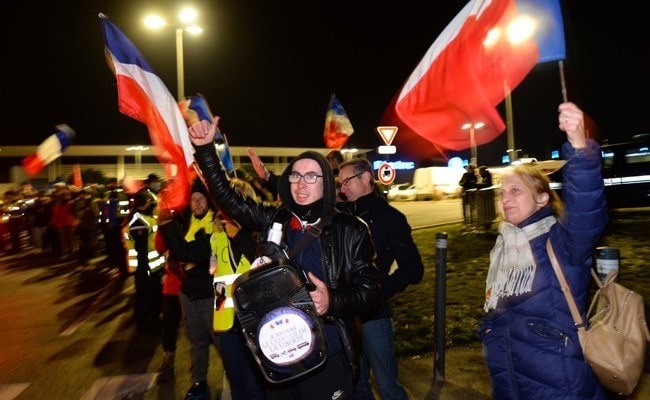| Translate This News In |
|---|
Thousands of opponents of the Covid rules slept on the outskirts of Paris early Saturday after driving in convoys from around France, bent on entering the city despite a prohibition imposed by police determined to avoid any blockade of the capital.
“Over the next three days, about 7,200 police and gendarmes will be deployed to enforce the ban on vehicle convoys,” according to the Paris police headquarters.
Didier Lallement, the prefect of the Paris police, claimed they had set up a temporary car pound that, along with hundreds of tow trucks, “will… put an end to any bottleneck.”
On Twitter, police flaunted their anti-blockade armament, posting photos of loader tractors for removing barriers as well as trucks equipped with cranes or water cannon.
For the first time since the “yellow vest” protests at the end of 2018, gendarmerie armoured vehicles have been deployed on the streets of the city.
Jean Castex, the Prime Minister, has promised to stick to his guns.
On Friday, he maintained on France 2 television that “if they restrict transportation or try to block the capital, we must be very firm about it.”
The protests comprised anti-Covid vaccination activists as well as individuals concerned about rapidly rising energy prices, who were inspired by Canadian truckers paralysing border traffic with the US.
Hundreds of cars, motorhomes, and vans from Lille, Strasbourg, Chateaubourg, and other cities gathered outside the Paris gates on Friday evening, but no convoy entered the capital, according to a police source.
They want the government’s vaccination pass, which is necessary to enter numerous public venues, to be removed, as well as extra assistance with their energy costs.
Lisa, like many other demonstrators, was involved in the “yellow vest” movement, which began as a response to a fuel tax hike but quickly expanded to include other grievances against President Emmanuel Macron.
Macron said Friday that he understood the “weariness” associated to the Covid-19 outbreak, just two months before presidential elections and with the administration trying to prevent violent scenes in the capital.
“Anger develops as a result of this exhaustion. I’m aware of it, and I’m respectful of it. However, I urge the utmost restraint “He told the publication Ouest-France.
‘It’s a betrayal,’ she says.
By Friday afternoon, police believed that 3,300 vehicles had been participating in the numerous convoys.
The event was cancelled by Paris police due to fears of “public order disturbances,” and protesters who attempted to obstruct roads would face fines or arrest.
The decision preventing the formation of convoys was confirmed by the courts on Friday, after two appeals were dismissed.
“It’s a betrayal of trust. The order is based on anti-vaccine and “yellow vest” sentiments that aren’t respectful of the law or the right to demonstrate “AFP spoke with activist Sophie Tissier.
The activists, who denied any intention of blocking the capital, were expecting to join the customary Saturday protests against the government’s vaccine push.
On his way from Illkirch-Graffenstaden in eastern Alsace, one activist, Robin, remarked, “It’s crucial that we don’t interfere with other people on the highways.” “That way, like in Canada, we’ll keep the population on our side.”
Some demonstrators plan to travel to Brussels for a “European convergence” of protesters on Monday.
Phil, a 58-year-old truck driver from Brittany, said his unwillingness to get vaccinated had caused “upheaval” in his personal and professional relationships.
“You feel less alone when you attend a demonstration,” he told AFP.
The administration has expressed sympathy for the demonstrators, with spokesperson Gabriel Attal attributing their rage to “tired and weariness” as a result of the Covid limitations.
The administration also stated on Friday that Covid regulations will be eased even more.


















